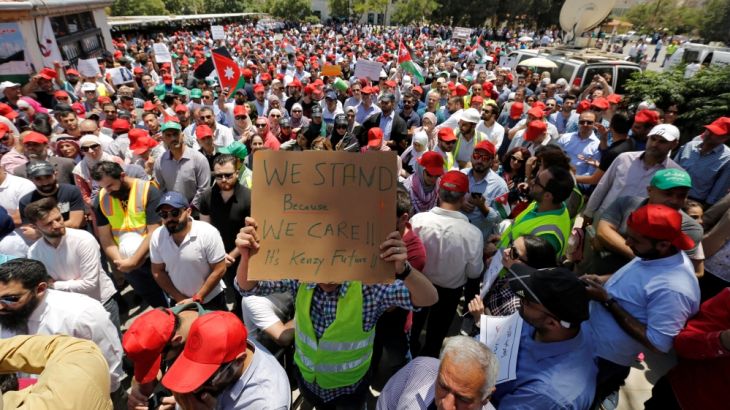Jordan trade unions strike to press for their demands
Jordanians vow to continue nightly protests demanding repeal of planned tax reform despite pledges to revise bill.

Jordan’s major trade unions have held one-day general strike in major cities across the Middle Eastern country as part of week-long protests against a controversial proposed tax reform bill and price hikes.
Thousands of protesters have continued their sit-ins across the country even after Prime Minister Hani al-Mulki was asked to resign by Jordan’s King Abdullah II.
Keep reading
list of 4 itemsChina’s economy beats expectations, growing 5.3 percent in first quarter
Inside the pressures facing Quebec’s billion-dollar maple syrup industry
Manipur’s BJP CM inflamed conflict: Assam Rifles report on India violence
|
|
The king appointed Omar al-Razzaz as the new prime minister and tasked him with reviewing the tax plan and launching a national dialogue with unions and civil society groups.
Al-Razzaz, a former World Bank economist who previously served as Jordan’s education minister, is described as a “likeable” figure among the Jordanian people.
But protesters demand that the proposed tax law be scrapped entirely, adding that a cabinet reshuffle is not enough to raise living standards.
Various trade unions are also calling for a system overhaul, Hiba Quntar, a member of Jordan’s press syndicate, told Al Jazeera.
The government’s economic reform measures are the latest in a series of economic changes since Amman secured a $723m three-year credit line from the International Monetary Fund (IMF) in 2016.
Reintroduce subsidies
Organisers of the latest wave of protests, led by an independent group referred to as the Hirak Shababi, or youth movement, told to Al Jazeera they are also calling for transparency, a clear set of goals, and an overall change in government policies.
They also want the government to reintroduce subsidies on bread and oil prices removed earlier this year.
Protests began last Wednesday in the capital and surrounding provinces, including Irbid, Zarqa and Salt, amid widespread anger over the IMF-backed reforms.
Hussein Smadi, a 26-year-old lawyer based in Amman, said: “the [unions] are under tremendous pressure to steer away from the streets and the youth movement”.
Hours after the launch of the general strike on Wednesday, Ali al-Ubous, head of the umbrella of unions, announced that the syndicates would be holding off on striking from now on in a bid to give the new government an opportunity to revise the proposed law.
His remarks were met with anger and frustration, Aroub Soubh – a Jordanian journalist and activist who was at the scene – said.
“People lost their cool, they started chanting and didn’t give al-Ubous a chance to finish speaking,” al-Soubh told Al Jazeera.
“They vowed to return to the streets and protest tonight,” she said from the protest site in Amman.
Trade unions representing doctors, lawyers, engineers, journalists, teachers and others are participating in the strike.
‘Raise minimum wage’
But the country’s factory workers and farmers, who belong to trade syndicates and earn less than the minimum wage of JD 220 ($310), say the proposed income tax law does not affect them.
They, however, have a slightly different set of demands.
Their priority is to reduce the price of commodities and accommodation, and more importantly, to raise the minimum wage.
|
|
For 43-year-old Mohammed al-Sneed, a JD 300 ($421) monthly salary is not enough for his family of seven.
“It’s me, my wife and five children,” he told Al Jazeera from Madaba, a town south of Amman.
The farmer, who heads the independent trade unions and holds a bachelor’s degree in agricultural engineering, was among thousands who took to the streets back in 2011, in the wake of the Arab Spring.
“We want to see corrupt officials finally held to account,” al-Sneed said.
He attributes the country’s economic crisis in its current form to the series of layoffs that took place a few years ago, when thousands of workers were made redundant.
“So unemployment rates increased, and of course the percentage of poor Jordanians did too,” he said.
Jordan has long suffered from economic problems and remains heavily reliant on foreign aid.
In the past, Jordanians have protested a sales tax increase and removal of bread subsidies, but the country’s poor especially took a hit when petrol prices were increased last week.
“The gap between the middle class and the poor is rapidly increasing – we want to diminish that as soon as possible,” al-Sneed said.